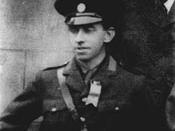A small booklet was published sometime after the execution of Micheal O'HAnnrachain, whose English name was Michael O'Hanrahan, that solely consisted of the lecture he delivered during the winter preceding the Easter Uprising of 1916. Not long after this lecture was delivered, he was executed on May 4th, 1916 at Kilmainham Gaol, charged with treason against the King of England. The lecture is titled 'Irish Heroines'. Although it is a tiny publication, this booklet holds a substantial importance in relevant research due to its quality, content, and context in the event of the Easter Uprising in Ireland.
O'Hanrahan begins by saying "Heroines have been known to all times and in all places. No age and no nation has been without them." He then goes on to describe what makes any person be considered a 'hero'. O'Hanrahan makes it point to mention that Ireland is not capable of rewarding its heroes the way America, France, and England are due to its severe poverty.
He also emphasizes the idea that what Ireland gives its heroes is greater than silver and gold, that Ireland gives its heroes 'sweet remembrance'. The rest of the lecture consists of several accounts of Irish heroines including Eoghan Ruadh, Nuala Ni Dhomhnaill, Rosa Ni Dhocartaigh, and Isabella Orr. The majority of these accounts deal mainly with strong women baring the grief of the loss of their husband and/or children. The list of heroines dates from the early 1600's to the late 1700's. O'Hanrahan concludes his lecture with the sentiment "You can whisper in your hearts we 'fought the good fight; we kept the faith'. And men and women looking back to your time will whisper in their hearts: 'These, these were heroines, every one.'"O'Hanrahan's lecture was most likely given to a large crowd of...


